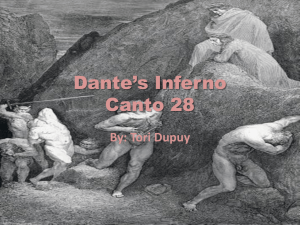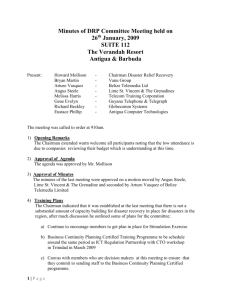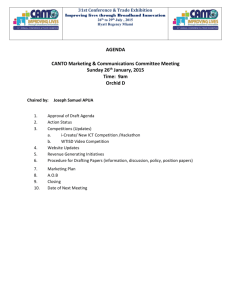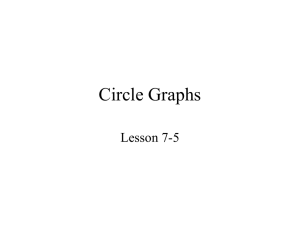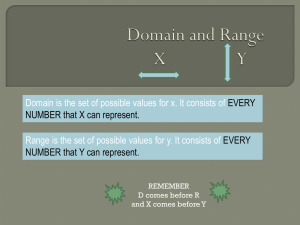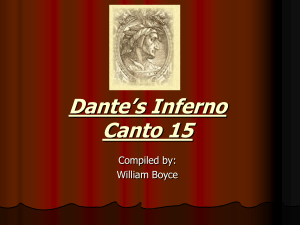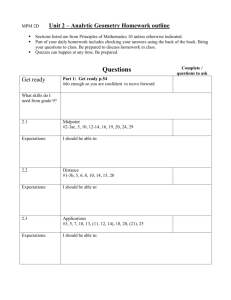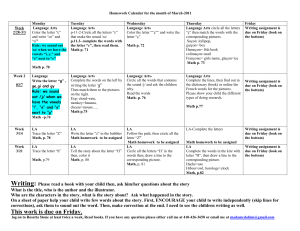Dante, Inferno - The University of West Georgia
advertisement
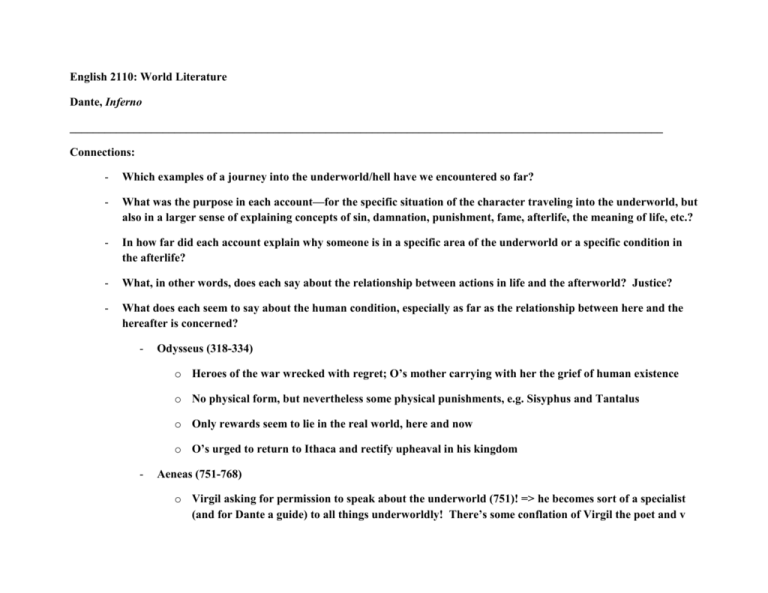
English 2110: World Literature Dante, Inferno ______________________________________________________________________________________________________ Connections: - Which examples of a journey into the underworld/hell have we encountered so far? - What was the purpose in each account—for the specific situation of the character traveling into the underworld, but also in a larger sense of explaining concepts of sin, damnation, punishment, fame, afterlife, the meaning of life, etc.? - In how far did each account explain why someone is in a specific area of the underworld or a specific condition in the afterlife? - What, in other words, does each say about the relationship between actions in life and the afterworld? Justice? - What does each seem to say about the human condition, especially as far as the relationship between here and the hereafter is concerned? - Odysseus (318-334) o Heroes of the war wrecked with regret; O’s mother carrying with her the grief of human existence o No physical form, but nevertheless some physical punishments, e.g. Sisyphus and Tantalus o Only rewards seem to lie in the real world, here and now o O’s urged to return to Ithaca and rectify upheaval in his kingdom - Aeneas (751-768) o Virgil asking for permission to speak about the underworld (751)! => he becomes sort of a specialist (and for Dante a guide) to all things underworldly! There’s some conflation of Virgil the poet and v o Path to the underworld beset with all the scourges of humankind; Aeneas tempted to fight against “empty images” (751, l. 377) o There are some different categories/realms here: - Souls of the unburied (752) “Souls of those who met an untimely, those who were falsely accused (755) Women who died as a consequence of passion Including Dido! (756) men famous in war (757) The Elysian Fields (762) => unclear why people are here; result of what? All Trojans! Thus: a political order! The practice of purgation and transmigration explained: 765 Qur’ran (1080) o Satan condemned to hell for disobedience; also: human beings punished to death for disobedience o But: faith can save humankind; Unbelievers condemned to a blazing fire (1087) o Thus: consequences in afterlife are a mix of obedience/disobedience (human actions) and faith Themes: - the journey from sin to redemption - relationship between human life and afterlife - divine justice: how human actions are punished and rewarded. - vindication of God (Is God just? Is the universe just and ordered?) - faith and the right path; doubt; uncertainty of faith (How do I know whether I will be saved? How do I know whether I am following the right path? Am I deceived? How to deal with doubt and uncertainty? ) Larger Questions: 1) Why does Dante go on this journey? (which, besides hell/inferno, also encompasses the purgatory and paradise/heaven) 2) What sense of divine justice, as well as the direction of his own life, does D./the traveler receive? a. How is justice done? In other words, who receives what punishment for what deeds/sins/transgressions? Why are the sins/transgressions ranked according to these levels? Which are the lightest, which are the worst? b. Concept of “contrapasso” or counterpenalty! 3) P. 1301: Do all suffer/get punished equally? Why do some suffer more than others? 4) Which sense of justice do you receive from this? a. Which sins or transgressions seem to be missing? b. Which are ranked or weighed too high or too low? c. Is anyone unjustly placed into hell? 5) What is the role of pity (both Dante/the speaker’s pity and our pity/the reader’s pity)? Why does D. pity certain souls? Does pity imply the injustice of their punishment? Is there ever any doubt of God’s justice? 6) What is the purpose of the journey? What is the intended effect on Dante/the speaker? (compare to Hawthorne’s “Young Goodman Brown”!) _______________________________________________________________________________________________________ Introduction—the vision of the poet (p. 1261): - God’s plan for the world, from its creation to the last judgment - Everything that happens in the world, every thought and action, known by God beforehand - Human perspective is limited: only the deeds of the past, the lessons of history and the memories of a scheme; thus: eternal/divine scheme cannot be comprehended or put into words - Structure of the poem: the transience, variety, and fascination of human life alternate with the eternity, unity and fixity of the afterlife - The afterlife like an enormous puzzle to be deciphered; thus: reader is taken on a journey of ever increasing knowledge about God’s plan - But: each soul encountered is a mystery; instead of giving us the answers, the poet wants us to be confused, intrigued, and even outraged by what we see - Reader is to be converted, but as an active participant - The three guides: personifications in an allegory about the conversion of a human soul; also: type of literature o Virgil = role of Reason in comprehending the rational cost of sin (damnation or expiation); the classics o Beatrice = love and faith; love poetry o ST. Bernard of Clairveaux = role of mystical vision and theology in achieving final, perfect fusion with God; mystical literature - Hell/inferno: o Describes the consequences of a sinful life and teaches the reader how to read the poem o Question: why or why not people should be there at all or in a particular circle of hell o Virgil: why is he in Limbo? o Question: the nature of sin For God, it may be simple and straight-forward For human beings: not easy to judge (what are the motivations? What is the nature of sin? What are the outcomes of sin?) Dangers of knowing hell too well Which parts of hell cause the most trouble, to the individual or society Sins of love and desire: close to the love that leads us to God! Fraud: why is this at the bottom of the pit (circle 8 and 9)? Categories of Sin: a) Seven Deadly Sins a. Lust b. Gluttony c. Greed d. Sloth e. Wrath f. Envy g. Pride b) Aristotle, Nicomachean Ethics (three types of immoral practice) a. Incontinence b. Bestiality c. Malice Specific Questions/Passages: Cantos 1-12 Canto 1: (1263-1269) - What kind of spiritual state is D. in at the beginning? - What temptations/sins are leading him astray? - What does Virgil say about the purpose of their journey? Canto 2: (1269-1272) - Why does D. doubt he can go through this journey? - How does V. encourage him? Who has sent him? - Why can Beatrice go into hell? Why can the misery of the condemned not move or afflict her? What about D.? And, by extension, the reader? Canto 3: (1272-1275) - Interpret the inscription above the gate to hell! What theological/spiritual concepts does it introduce? (Any questions, objections???) - Who is in the ante-hell and why? What is their peculiar fate? Canto 4: (1276-1279) - Who is in Limbo, the first circle, and why? - Does D. question their place here, and how does V. respond? - What is this place like? - What do you think about the justice of the inhabitants placed here??? Canto 5: 1279-1283 - Second Circle—the lustful - Why are the inhabitants here? What does the chapter say about their transgressions? - Any particular, familiar inhabitants? - How does D. respond to Francesca’s story? Why? Canto 6: 1283-1286 - 3rd Circle - The gluttonous and supine - What kind of a punishment do they receive? Why is this appropriate? (contrapasso) - What does V. answer to D.’s question about the result of the last judgment on the torments of hell? (1285-86) Canto 7: 1286-1292 - Fourth Circle: the Avaricious and prodigal - What seems to be D’s worst enemy during his journey, that might keep him from completing it? How does V. help him go on? (esp. 1286) - How is each sin punished? - What does this chapter say about wealth and fortune? - Fifth circle: the wrathful and sullen - How is the city of Dis described? (1291) Canto 9: (1292-1295) - 6th circle - Who helps V. and D. advance into the city of Dis? What does this say about relationship between heaven and hell, as well as D’s special mission? Canto 10: 1295- Still 6th circle - The arch-heretics - Why are the Epicureans there? Canto 11: 1299- How does the focus (or the origin of sin) shift here? (p. 1300) - Analyze the foreshadowing toward circle 7, 8, and 9! Who is where and why? What transgressions are particularly pernicious and why? - What question regarding sin and punishment (and thus divine justice) does D. raise here, and how does V. answer it? Canto 12: 1302-1306 - Seventh circle, first ring - Violent against their neighbor Canto 13: 1306-1309 - Seventh Circle, 2nd ring - Violent against themselves; suicides Canto 14: 1309-1313 - Seventh Circle, 3rd ring - Violent against God - First zone: blasphemers Canto 15: 1313-1316 - Seventh Circle, 3rd ring - Violent against God - Second zone: the sodomites Canto 16: 1316-1319 - Seventh Circle, 3rd ring - Second zone: other sodomites - Dante’s cord cast and the raising of a beast (1319) Canto 17: 1319- Seventh Circle, 3rd ring, Third Zone - Violent against nature and art (usurers) - The usurers eyeing their purses - Flying on Geryon down to the 8th circle Canto 18: 1323-1326 - THE BEGINNING OF FRAUD - Eight Circle (“malebolge”), with its 10 pouches - First pouch: panders and seducers o First occurrence of horned demons! o Pimps o Seducers of women: Jason (the Argonaut) - Second pouch: flatterers o Nasty smell o Flatterers living in excrement; clerics o Thais Canto 19: 1326-1330 - 8th circle, third pouch - Simonists (those who sell spiritual offices, favors, etc.) - Q: how does D’s response to the punishment and design of hell change here? (1327) - Head and torsos stuck in the ground, with the soles of their feet on fire - Q: Evaluate Dante’s take on the papacy, or the institutions of the Catholic church in general here! (13281329) - Is he really primarily talking to the sinners in hell here?? Canto 20: 1330-1333 - 8th circle, fourth pouch - Diviners, astrologers, magicians; all have their heads turned backward - Q: What’s their punishment? Why? - Why/how does V. berate D. for his pity? - Q: Why is Tiresias here? Canto 21: 1333-1337 - Eight circle, fifth pouch - Barrators (those who sell public offices, favors, etc. i.e. corrupt politicians and civil servants!) - Malacoda (“Evil-Tail”), the chief of the “Malabranche” (“Evil-Claws”) - Q: how does V. respond to Malacoda’s challenge? - Q: Why do they need a demon escort? Canto 22: 1337-1340 - Eight circle, fifth pouch (still) - V. and D. proceeding in a procession with 10 demons, chosen to accompany them! - Q: How do you interpret the section where two of the demons get stuck in the tar and pitch while trying to catch one of the sinners? Why does D. pay so much attention to the fate of the demons here? Does he humanize the demons? Canto 23: 1340-1344 - Eight circle, fifth pouch - D. is worried about the consequences of the demons’ scorn having been increased - V. takes a motherly role toward D! - The 6th pouch: hypocrites o Their coats are yellow on the outside, but made of lead o Caiaphas is tormented on the cross (1343) Canto 24: 1344-1348 - Eight circle, sixth pouch - More hypocrites Canto 25: 1348-1351 - Eight circle, seventh pouch - Thieves - WOW: WHAT HAPPENS HERE BETWEEN THE SINNER AND THE DEMON??? WHY? WHAT DOES THIS SIGNIFY? (1349-1351) Canto 26: 1351-1355 - Eight circle, seventh pouch - Thieves - Q: HOW DO YOU READ ULYSSEE’S ACCOUNT HERE? WHY IS DANTE SO ADAMANT ABOUT HEARING U’S STORY? Canto 27: 1355- Eight circle, eight pouch - Fraudulent counselors Canto 28: 1359- Eight circle, ninth pouch - Sowers of scandal and schism o Very graphic description of punishment (p. 1359) o Mohammed! Canto 29: 1362- Eight circle, ninth pouch - 10th pouch: falsifiers Canto 30: 1366 - Eight circle, tenth pouch Canto 31: 1369 - Nine circle; the central pit of hell - descent Canto 32: 1373 - first ring: traitors to their kin - 2nd ring: traitors to their homeland Canto 33: 1377 - Third ring: traitors against their guests (hospitality!) Canto 34: 1380 - ANALYZE THE APPEARANCE OF AND ENCOUNTER WITH LUCIFER/SATAN! IS THIS WHAT YOU EXPECTED? WHAT D. EXPECTED? WHAT DOES THIS ENCOUNTER AT THE BOTTOM OF HELL SAY ABOUT THE NATURE OF EVIL? _____________________________________________________________________________________________________ Wednesday, October 21, 2009 ____________________________________________________ 1) From Canto 12 to 34, find examples of “contrapasso” or “counterpenalty”! What does the punishment tell us about the crime/sin? Does the punishment seem just or justified? To Dante, or to you? 2) While you're reading, pay specific attention to who is in the lower circles of hell, especially 8 and 9 and for what reasons. - - Why do you think Dante places such an emphasis on _fraud_ (in various permutations)? What kind of actions does fraud comprise for him? More importantly, what are its effects, especially on human bonds and human society? On Wednesday, I want to explore some connections between Dante's Inferno and current events, especially the economic and financial crisis we're in right now. What are the things and who are the people/institutions/practices that caused this crisis, and, importantly, what are its effects on human society? Any connections to Dante??? What would Dante say about all this mess? ____________________________________________ Hieronymous Bosch, The Seven Deadly Sins Bosch, The Garden of Earthly Delights

